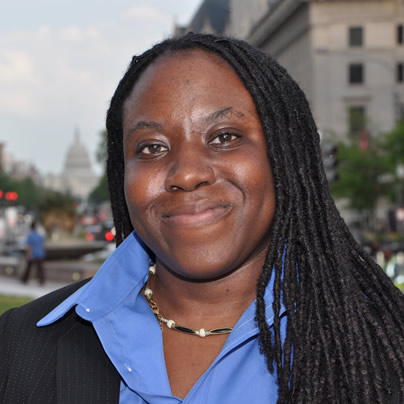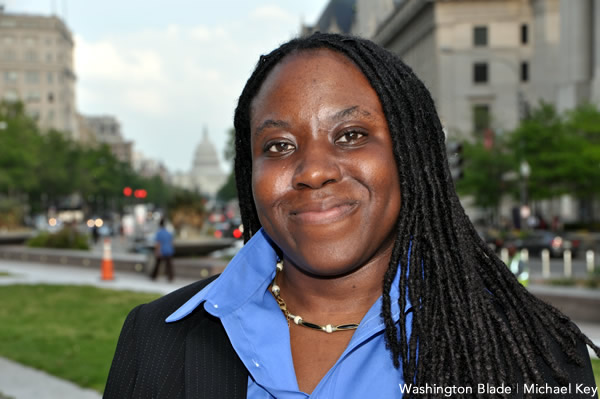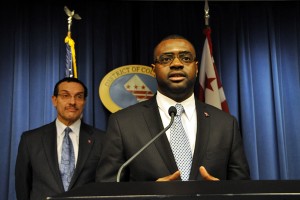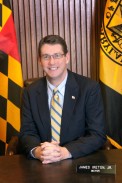Local
More than a dozen local LGBT Dems to attend convention
17 delegates from D.C., Maryland and Virginia headed to Charlotte


Lateefah Williams, president of the Stein Club, is one of five openly gay and lesbian D.C. Democrats headed to the party’s national convention. (Washington Blade file photo by Michael Key)
As Democrats prepare for their party’s upcoming convention in Charlotte, local LGBT delegates stress they look forward to representing the community at the quadrennial gathering.
“I’m excited to be going to the convention and I’m honored to represent D.C. in Charlotte,” said Lateefah Williams, president of the Gertrude Stein Democratic Club. She is among the four openly LGBT delegates who will represent the nation’s capital at the Democratic National Convention that will kick-off on Sept. 4. Gay labor activist Gregory Cendana is among them, while Democratic activist David Meadows will serve as an alternate. “My goal is to provide a voice for all D.C. residents, particularly the LGBT community.”
Jeffrey Richardson, director of the Mayor’s Office of GLBT Affairs and the former vice chair of the D.C. Democratic Party, has attended two previous conventions as either a delegate or a volunteer. He told the Blade that this year is different in part because the presumptive nominee is the incumbent president.
“We’ll be focused on how we will unite the party, unite the base to ensure that President Obama gets re-elected,” Richardson said.
Earl Fowlkes, CEO of D.C. Black Pride and a member of the Democratic National Committee, will attend his first convention as a delegate. “I’m glad I’m going with all these people from D.C., which is wonderful,” he said. “I’m really very happy because this administration, this president has been so forthright in his skill in really creating a better environment for the LGBT community. He started slow, but he gained momentum and he’s come full circle and he supports the things that we all support that we believe will make us full citizens of the country.”
Members of Maryland’s LGBT delegation echoed Fowlkes.
“President Obama has stood up for us in so many ways in the face of a very strong and virulent opposition,” said state Del. Mary Washington (D-Baltimore City,) who will attend the Democratic National Convention for the first time. “Now it is time that our community and our allies protect him at the ballot box.”
Gay Salisbury Mayor James Ireton is also a first-time delegate.
“I am excited and proud to be representing the First Congressional District and my hometown, Salisbury, Md., at the Democratic National Convention,” he told the Blade. “I am also proud to be a small part of the diversity that is, in my opinion, one of America’s and Maryland’s greatest strengths.”
In addition to Ireton and Washington, state Dels. Maggie McIntosh (D-Baltimore City) and Heather Mizeur (D-Montgomery County), Somerset Mayor Jeffrey Slavin, transgender activist Dana Beyer and Mitch Case of Ellicott City are also members of Maryland’s LGBT delegation.
Beyer, a member of the convention’s Credentials Committee who is among the 11 openly trans delegates to this year’s convention, told the Blade she feels it remains important for out LGBT people to attend the convention.
“The more of us that exist out there, the better we can do our jobs and lay the groundwork for the next four years,” she said.
Gay Virginia state Sen. Adam Ebbin (D-Alexandria) is among the four openly LGBT members — Peter Owen of the Arlington County Democratic Committee, Joel McDonald of the Virginia Beach Democratic Committee and Edmund Turner of Richmond — of the commonwealth’s convention delegation. He echoed others who pointed out what they maintain is Obama’s pro-LGBT record as president.
“There is no question that the president is 100 percent,” said Ebbin, who is also a member of the Credentials Committee. “Bill Clinton had said some of the right things and appointed some of the right people, but President Clinton did do some things that were regrettable and not acceptable to the community when he was president. We have nothing to apologize for. We have everything to be proud of and we have a president who not just on LGBT issues, but issues in general we can be proud of.”
National Stonewall Democrats data indicates that at least 470 of the 5,963 delegates slated to attend this year’s convention are openly LGBT — nearly double the 277 delegates who attended the 2008 Democratic National Convention in Denver. They will also vote on a proposed platform that includes a same-sex marriage plank.
“This historic act by our party affirms that Democrats and President Barack Obama intend to continue to play a significant role in advancing civil rights for our LGBT community,” Washington said. “This is in stark contrast to that of the national Republican Party, which is clearly set on articulating a platform that seeks to turn back the clock not only for LGBT people, but for women and working and middle class [people] across the country.”
Williams agreed.
“It sends a message that the Democratic Party is inclusive,” she said. “For equality-minded people it does matter to see the party taking a strong stance in support of valuing all families.”
A Harris Interactive poll that Logo TV commissioned earlier this month found that the economy, unemployment and health care rank among LGBT voters’ top concerns going into the presidential election. Nine percent of respondents listed gay rights as their top priority, while only six percent said marriage rights for same-sex couples is the most important issue.
Only one percent of non-LGBT respondents identified gay rights and nuptials for same-sex couples as their top priorities.
Richardson conceded that he feels conservatives could potentially use marriage as what he described as a wedge issue among people of faith and communities of color in specific geographic areas. He stressed, however, that the economy will remain the dominant issue going into November. “The economy is just such a big issue,” Richardson said. “If I don’t have a job, I’m not all that concerned about who you marry.”
Williams was more optimistic.
“I don’t think it’s going to have an adverse effect because a lot of the people who have been strong supporters of President Obama do not support marriage equality still strongly support his ideas and his agenda on other issues,” she said. “I really don’t see those individuals backing away from him on the basis of one issue.”
In the end, local LGBT delegates remain optimistic that Obama will be re-elected in November.
“I think he’s going to win. I know he’s going to win,” Fowlkes said. “Fundamentally, the president’s a decent man, a good man. And his administration has done a good job at keeping this country from falling apart.”
Ebbin agreed.
“When the American people focus on his accomplishments and his role as president and what would have happened if we hadn’t had him, compared to the alternative, I think that people will support the president,” he said, further noting that Obama continues to poll well in Virginia and other battleground states. “That’s something that we’re really proud of, but it’s something that we can’t take for granted.”

In an official statement released at the reveal event Capital Pride Alliance described its just announced 2026 Pride theme of “Exist, Resist, Have the Audacity” as a “bold declaration affirming the presence, resilience, and courage of LGBTQ+ people around the world.”
The statement adds, “Grounded in the undeniable truth that our existence is not up for debate, this year’s theme calls on the community to live loudly and proudly, stand firm against injustice and erasure, and embody the collective strength that has always defined the LGBTQ+ community.”
In a reference to the impact of the hostile political climate, the statement says, “In a time when LGBTQ+ rights and history continue to face challenges, especially in our Nation’s Capital, where policy and public discourse shape the future of our country, together, we must ensure that our voices are visible, heard, and unapologetically centered.”
The statement also quotes Capital Pride Alliance CEO and President Ryan Bos’s message at the Reveal event: “This year’s theme is both a declaration and a demand,” Bos said. “Exist, Resist, Have Audacity! reflects the resilience of our community and our responsibility to protect the progress we’ve made. As we look toward our nation’s 250th anniversary, we affirm that LGBTQ+ people have always been and always will be part of the United States’s history, and we will continue shaping its future with strength and resolve,” he concluded.
District of Columbia
Capital Pride board member resigns, alleges failure to address ‘sexual misconduct’
In startling letter, Taylor Chandler says board’s inaction protected ‘sexual predator’

Taylor Lianne Chandler, a member of the Capital Pride Alliance Board of Directors since 2019 who most recently served as the board’s secretary, submitted a letter of resignation on Feb. 24 that alleges the board has failed to address instances of “sexual misconduct” within the Capital Pride organization.
The Washington Blade received a copy of Chandler’s resignation letter one day after she submitted it from an anonymous source. Chandler, who identifies as transgender and intersex, said in an interview that she did not send the letter to the Blade, but she suspected someone associated with Capital Pride, which organizes D.C.’s annual LGBTQ Pride events, “wants it out in the open.”
“It is with a heavy heart, but with absolute clarity, that I submit my resignation from the Capital Pride Alliance Board of Directors effective immediately,” Chandler states in her letter. “I have devoted nearly ten years of my life to this organization,” she wrote, pointing to her initial involvement as a volunteer and later as a producer of events as chair of the organization’s Transgender, Gender Non-Conforming, and Intersex Committee.
“Capital Pride once meant something profound to me – a space of safety, visibility, and community for people who have often been denied all three,” her letter continues. “That is no longer the organization I am part of today.”
“I, along with other board members, brought forward credible concerns regarding sexual misconduct – a pattern of behavior spanning years – to the attention of this board,” Chandler states in the letter. “What followed was not accountability. What followed was retaliation. Rather than addressing the substance of what was reported, officers and fellow board members chose to chastise those of us who came forward.”
The letter adds, “This board has made its priorities clear through its actions: protecting a sexual predator matters more than protecting the people who had the courage to come forward. … I have been targeted, bullied, and made to feel like an outsider for doing what any person of integrity would do – telling the truth.”
In response to a request from the Blade for comment, Anna Jinkerson, who serves as chair of the Capital Pride board, sent the Blade a statement praising Taylor Chandler’s efforts as a Capital Pride volunteer and board member but did not specifically address the issue of alleged sexual misconduct.
“We’re also aware that her resignation letter has been shared with the media and has listed concerns,” Jinkerson said in her statement. “When concerns are brought to CPA, we act quickly and appropriately to address them,” she said.
“As we continue to grow our organization, we’re proactively strengthening the policies and procedures that shape our systems, our infrastructure, and the support we provide to our team and partners,” Jinkerson said in her statement. “We’re doing this because the community’s experience with CPA must always be safe, affirming, empowering, and inclusive,” she added.
In an interview with the Blade, Chandler said she was not the target of the alleged sexual harassment.
She said a Capital Pride investigation identified one individual implicated in a “pattern” of sexual harassment related behavior over a period of time. But she said she was bound by a Non-Disclosure Agreement (NDA) that applies to all board members and she cannot disclose the name of the person implicated in alleged sexual misconduct or those who came forward to complain about it.
“It was one individual, but there was a pattern and a history,” Chandler said, noting that was the extent of what she can disclose.
“And I’ll say this,” she added. “In my opinion, with gay culture sometimes the touchy feely-ness that goes on seems to be like just part of the culture, not necessarily the same as a sexual assault or whatever. But at the same time, if someone does not want those advances and they’re saying no and trying to push you away and trying to avoid you, then it makes it that way regardless of the culture.”
When asked about when the allegations of sexual harassment first surfaced, Chandler said, “In the past year is when the allegation came forward from one individual. But in the course of this all happening, other individuals came forward and talked about instances – several which showed a pattern.”
Chandler’s resignation comes about five months after Capital Pride Alliance announced in a statement released in October 2025 that its then board president, Ashley Smith, resigned from his position on Oct. 18 after Capital Pride became aware of a “claim” regarding Smith. The statement said the group retained an independent firm to investigate the matter, but it released no further details since that time. Smith has declined to comment on the matter.
When asked by the Blade if the Smith resignation could be linked in some way to allegations of sexual misconduct, Chandler said, “I can’t make a comment one way or the other on that.”
Chandler’s resignation and allegations come after Capital Pride Alliance has been credited with playing the lead role in organizing the World Pride celebration hosted by D.C. in which dozens of LGBTQ-related Pride events were held from May through June of 2025.
The letter of resignation also came just days before Capital Pride Alliance’s annual “Reveal” event scheduled for Feb. 26 at the Hamilton Hotel in which the theme for D.C.’s June 2026 LGBTQ Pride events was to be announced along with other Pride plans.
District of Columbia
Capital Stonewall Democrats elect new leaders
LGBTQ political group set to celebrate 50th anniversary

Longtime Democratic Party activists Stevie McCarty and Brad Howard won election last week as president and vice president for administration for the Capital Stonewall Democrats, D.C.’s largest local LGBTQ political organization.
In a Feb. 24 announcement, the group said McCarty and Howard, both of whom are elected DC Advisory Neighborhood Commissioners, ran in a special Capital Stonewall Democrats election to fill the two leadership positions that became vacant when the officers they replaced resigned.
Outgoing President Howard Garrett, who McCarty has replaced, told the Washington Blade he resigned after taking on a new position as chair of the city’s Ward 1 Democratic Committee. The Capital Stonewall Democrats announcement didn’t say who Howard replaced as vice president for administration.
The group’s website shows its other officers include Elizabeth Mitchell as Vice President for Legislative and Political Affairs, and Monica Nemeth as Treasurer. The officer position of secretary is vacant, the website shows.
“As we look toward 2026, the stakes for D.C. and for LGBTQ+ communities have never been clearer,” the group’s statement announcing McCarty and Howard’s election says. “Our 50th anniversary celebration on March 20 and the launch of our D.C. LGBTQ+ Voter’s Guide mark the beginning of a major year for endorsements, organizing, and coalition building,” the statement says.
McCarty said among the organization’s major endeavors will be holding virtual endorsement forums where candidates running for D.C. mayor and the Council will appear and seek the group’s endorsement.
Founded in 1976 as the Gertrude Stein Democratic Club, the organization’s members voted in 2021 to change its name to Capital Stonewall Democrats. McCarty said the 50th anniversary celebration on March 20, in which D.C. Mayor Muriel Bowser and members of the D.C. Council are expected to attend, will be held at the PEPCO Gallery meeting center at 702 8th St., N.W.



















